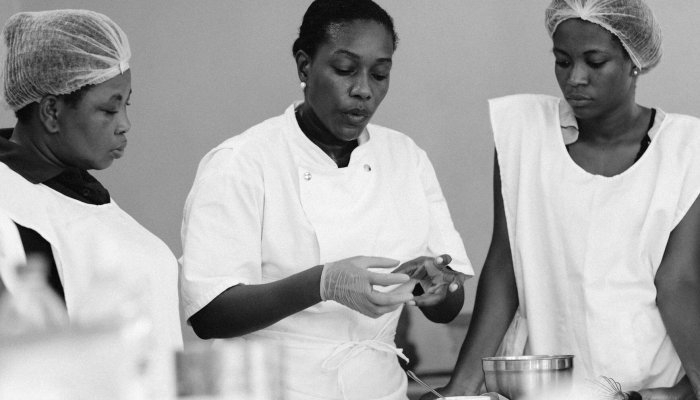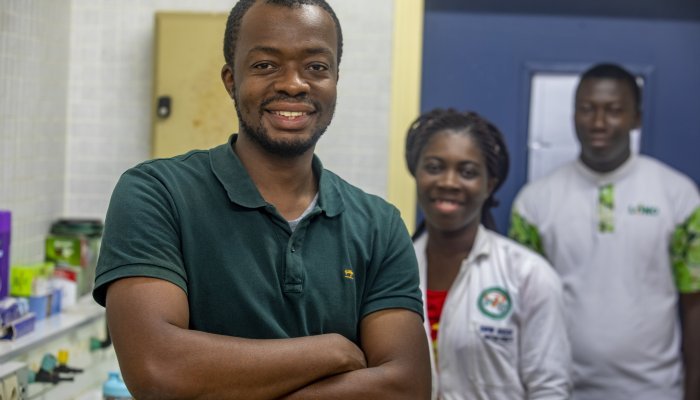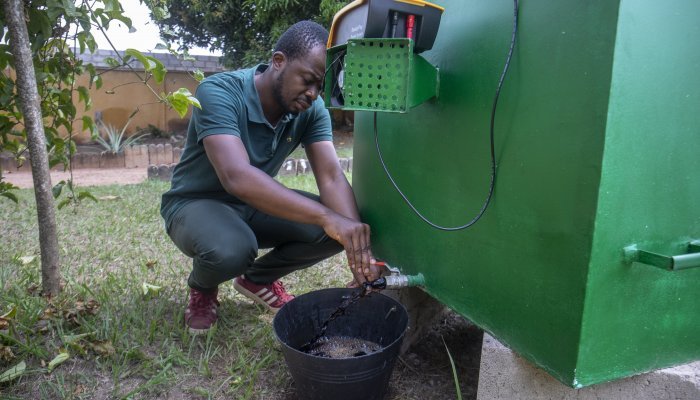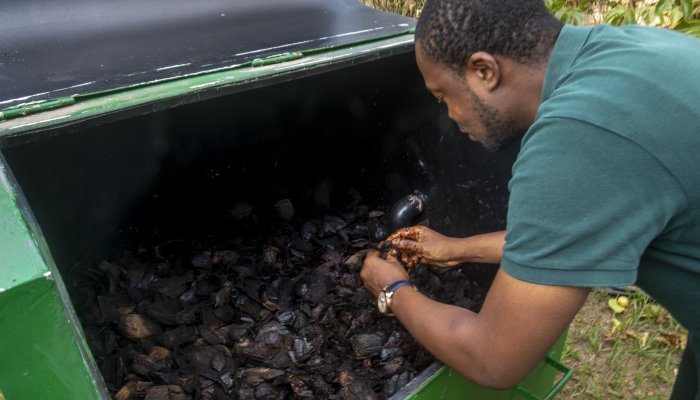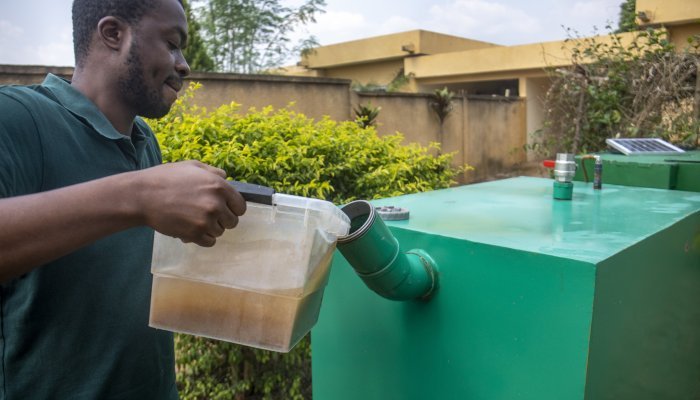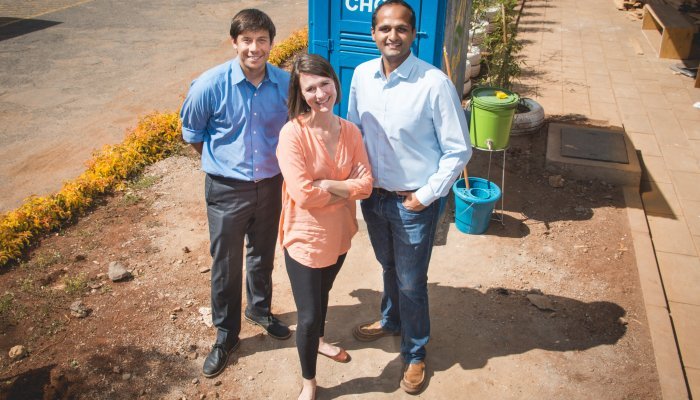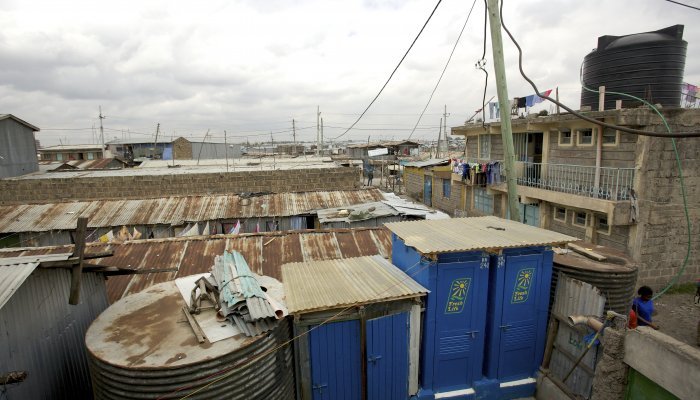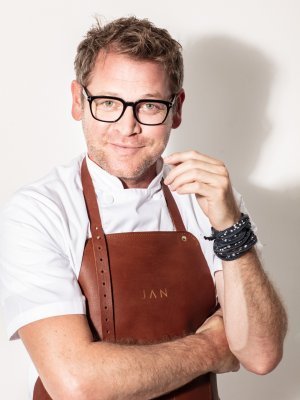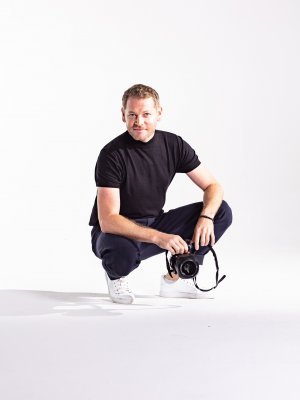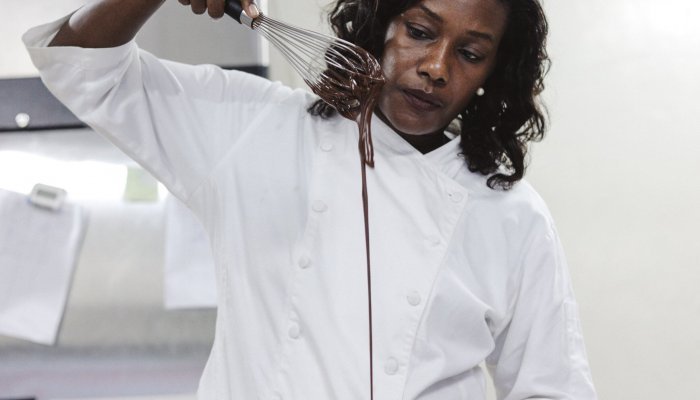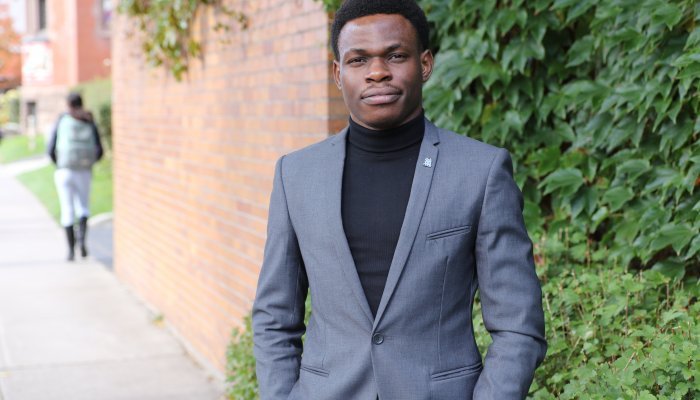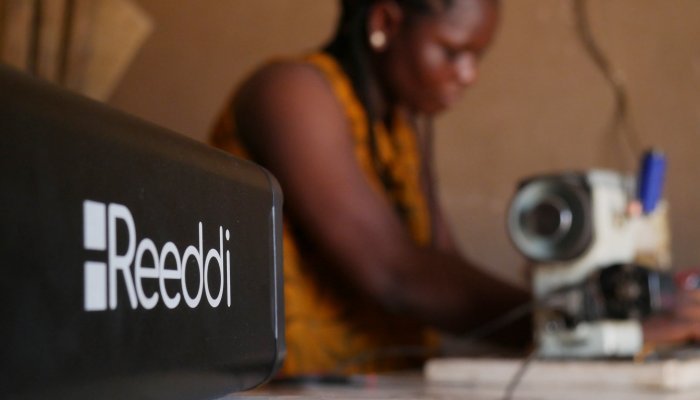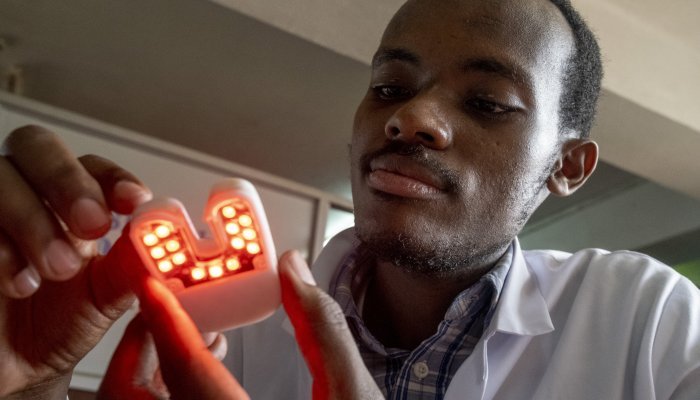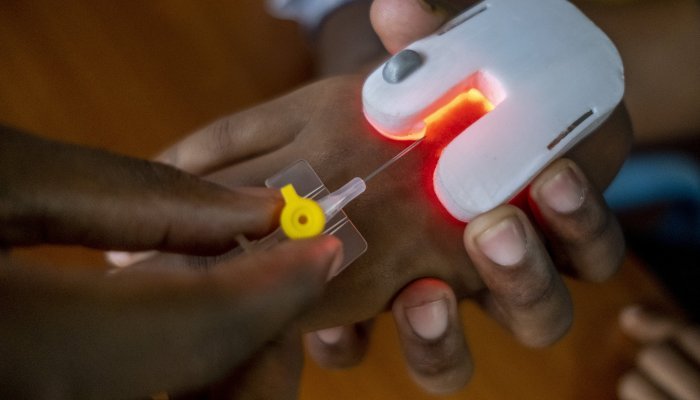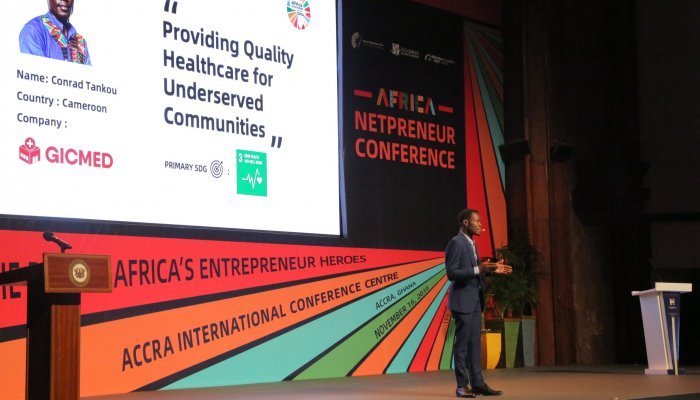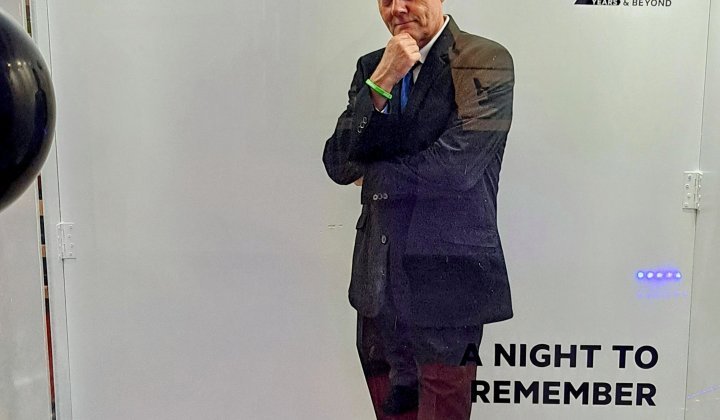What is an innovator?
The dictionary defines an innovator as someone who introduces changes and new ideas. Amidst the swirl of technological changes, it is easy to get bogged down in the idea of innovation being the preserve of digital platforms or machine creations. Not so. Innovators span industries, healthcare, music, social media and supply chains. They challenge the status quo, spot new opportunities and turn great ideas into new products, methods and businesses. They are the pioneers.
**
Kombo Ekra Noël N’Guessan
Kubeko – Transforming waste into valuable by-products
N’Guessan, an Ivorian entrepreneur, has two waste management innovations to his name: Smart-T, a financial exchange service that farmers can use to make money from biowaste, and Kubeko, a biowaste innovation for small-scale West African farmers.
A chemical engineer by training, N’Guessan and his team designed and patented Kubeko as a low-cost processing solution for farmers. Kubeko is both a composter and a biodigester that enhances the natural fermentation of agricultural waste to produce both solid and liquid bio-fertiliser. Biogas for use in cooking is another important result. The intention behind the innovation is two-fold: to help farmers and their families create additional income and provide a viable solution to waste disposal in a country where some 30 million tonnes of waste are disposed of each year.
During an interview in February 2022, N’Guessan said, “It’s a productive tool. Yes, you have to protect the environment, sure, but it needs to be bankable; otherwise scalability is always limited.”
In 2021, N’Guessan won the Royal Academy of Engineering’s Africa Prize for Engineering Innovation.
Ani Vallabhaneni, David Auerbach, Lindsay Stradley, Nathan Cooke and Joel Veenstra
Sanergy – A circular sanitation solution
The founders of Sanergy arrived at the idea to design and roll out high-quality, low-cost and no-water sanitation facilities for informal African settlements during their time at MIT in the US. Three of the founders – Vallabhaneni, Stradley and Auerbach – had lived in Nairobi, Kenya, for years and brought their knowledge of the growing sanitation problem facing urban slums on the continent to the drawing board. Their solution was both environmentally and socially innovative.
Sanergy’s Fresh Life Toilets provide a means of community involvement through the purchase and operation of the sanitation facilities on a franchise basis, creating jobs and opportunities on the ground and supported by education. In addition, the company’s waste disposal strategy taps into a sustainable circular economy model to solve both the sanitation infrastructure problem and the dumping of untreated waste into the environment. Waste from slums is collected daily and transported to a central Sanergy organics recycling factory in Kenya, where black soldier fly larvae convert the waste into an organic fertiliser called Evergrow and insect protein for animal feed and biomass briquettes.
Winner of the Food Planet Prize in 2020, Sanergy was named among the finalists of the inaugural Earthshot Prize in 2021.
Jan Hendrik van der Westhuizen
Michelin-star chef and culinary innovator
When it comes to innovation in the culinary space, South Africa’s first Michelin-star chef is already renowned for blending local farm-style cooking with fine French dining at his restaurants JAN in Nice, France, and Klein JAN in the Kalahari.
From his glossy ‘Jan the JOURNAL’ cookbook, replete with recipes and exquisite photo essays, to his effective use of social media, Jan Hendrik van der Westhuizen’s imprint on South African cuisine is already notable. His latest venture, the online JAN Innovation Academy, was born out of the Covid-19 lockdowns with the motivation of creating something online and sharing skills at the core. The academy features video lessons and learning material and virtual mentorship to upskill people in the restaurant business.
Speaking to Acumen, Van der Westhuizen explained: “It’s only in its starting phase, with many courses rolling out in the next few months. Our team of chefs and media crew push limits at the innovation studio to produce content based on a strong backbone. Our heritage gives us direction and with this comes so many incredible new ideas, which are innovative and creative. The combination of the two is essential.”
As for other projects on the horizon, for now, Van der Westhuizen is fully focused on the academy and Klein JAN, which opened in 2021. “These two are really fresh projects that need care and devotion,” he says. “I have also learned that we don’t always have to have something new on the agenda.”
Selassie Atadika
Advocate for ‘new African cuisine’
Selassie Atadika is a founding member of Trio Toque, the first nomadic restaurant in Dakar, Senegal, which offers a multi-course menu crafted by chefs committed to sharing unique African tastes using top-quality, locally-sourced foods. Atadika, who connected with the pop-up restaurant idea while studying at the Culinary Institute of America, is an advocate for what she terms ‘new African cuisine’.
Atadika’s own food enterprise, Midunu, also follows the nomadic tradition and offers a private dining experience in Accra, Ghana, her home country. She describes Midunu as a culinary lifestyle company that creates experiences where culture, community and cuisine intersect. She strives to foster a greater understanding of culinary culture among people across Africa.
Like Trio Toque, Midunu uses local, seasonal and often underutilised ingredients such as traditional grains and proteins, with an ever-present eye on supporting biodiversity and sustainability. The company curates white-linen nomadic events, private dining, retail and lifestyle products, and boasts a bespoke event space. Atadika’s nomadic dinners, in particular, have come to achieve worldwide acclaim, as have Midunu’s renowned handcrafted chocolate truffles.
Atadika won the 2021 La Liste New Destination Champion Award for raising awareness of Africa as a gastronomic destination.
Olugbenga Olufemi Olubanjo
Reeddi – Making electricity affordable and accessible in energy-poor communities
Like Sanergy, Reeddi Capsules was shortlisted for the inaugural The Earthshot Prize. The buzz around the high-profile awards in late 2021 and being shortlisted for the Royal Academy of Engineering’s Africa Prize put founder, Olugbenga Olubanjo, and Reeddi firmly on the radar.
According to the Royal Academy, “Reeddi capsules contain lithium-ion cells, improved by a proprietary battery optimisation algorithm to extend the lifespan of the capsule from two to four years, an increase from 500 to more than 1,200 charge cycles.”
According to Canada-based Olubanjo, using Reeddi capsules saves his customers 30% of their usual energy expenses in Nigeria. While the capsules are currently charged at central locations, Olubanjo plans to create solar-powered charging stations closer to the communities he serves to enable his users to recharge their capsules themselves.
In addition to the Reeddi Capsules, Olubanjo’s company is active in the home solar system and diesel generator space.
Dr. Julius Mubiru
Better vein visualisation for African children
Dr. Julius Mubiru, co-founder of the A-Lite Vein Locator, spotted a challenge in treating children in clinics and hospitals across Africa. It remains difficult to insert a drip or draw blood from collapsed veins or veins that are hardly visible. The solution was a simple device that helped medical staff by highlighting veins, particularly those of dark-skinned people and children.
When passed over a hand, the A-Lite Vein Locator uses a red light that reflects everything except the veins since the deoxy-haemoglobin in the red blood cells absorbs the light. This creates a shadow effect, which maps out the veins in the body.
Shortlisted for the 2022 Africa Prize for Engineering Innovation, Dr. Mubiru explains the motivation behind the innovation to Innovate Uganda: “Nobody likes needles. However, vein visibility is not just an issue of comfort. We would like to see far more of what is called ‘first-needle successes’, where the vein is found on the first try, saving medical staff time, sparing children unnecessary trauma, and getting medicine to those who need it as quickly as possible.”
According to the Royal Academy, “The next step in the device’s development is to conduct clinical trials to confirm efficacy and safety, and measure its impact in a medical setting.”
Conrad Tankou
Early health detection and treatment
Cameroonian Conrad Tankou, a medical doctor and CEO of Global Innovation and Creativity Space (GIC Space), won the 2021 Africa Young Innovators for Health Award. During a discussion with a French news programme, Télésud, he explained how working in communities highlighted the risk of cervical and breast cancer among women, particularly those in rural areas. Without fast detection, many of these women had a higher risk of death, which was compounded by the lack of cancer specialists in Cameroon. So, Tankou created GICMED, a combination of five technologies to remotely screen and diagnose these two common cancers affecting women in Africa.
The GICMED technology comprises a telemedicine platform, a digital microscopy system run via a smartphone, a smart speculum device, a fine-needed aspirate biopsy device, and e-learning and training information, all of which can be used in poorly serviced rural areas to ensure faster and valid diagnoses.
Tankou’s ambition is to ensure GICMED’s availability across Cameroon in the coming years and then expand across sub-Saharan Africa. Furthermore, the company says it is currently leveraging its innovations to target “many more diseases and unmet needs” in the developing world.
**
Also on the radar…
- Getnet Assefa. The founder of iCog Labs in Ethiopia, Assefa, launched his country’s first artificial intelligence lab in Addis Ababa in 2013. The lab was involved in programming Sophia the humanoid robot that was granted Saudi Arabian citizenship in 2017.
- Miishe Addy. Started by Addy and Solomon Torgbor in 2018, Jetstream Africa is a Ghanaian company that enables businesses to control cross-border supply chains in Africa. According to Techcrunch, “It aggregates private sector logistics providers at African ports and borders, and brings them online.”
- Farah Emara. A business-to-business agri-supply chain platform, FreshSource recently closed a seven-figure US dollar seed funding round. This sets the platform up well to achieve founders Farah and Omar Emara’s ambitions to become the biggest fresh food distribution in the Middle East and North Africa. The business was started in 2019.
- John Amanam. A sculptor and prosthetic artist from Nigeria, Amanam founded Immortal Cosmetic Art after observing the lack of realistic prostheses for people with darker skin tones. “You rarely find people with black skin prosthetics,” he told Reuters. “I want this need to be met within Africa.”


